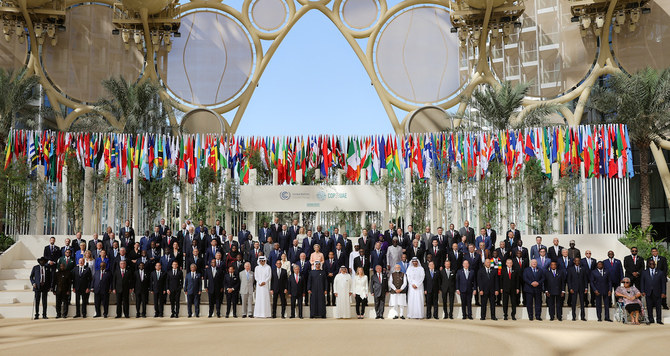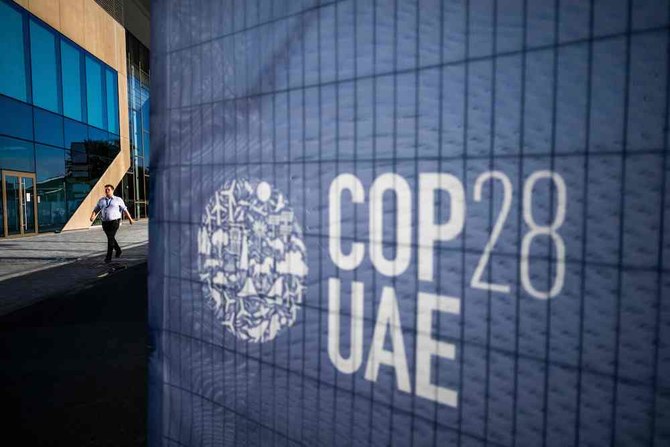DUBAI: More than 130 world leaders take centerstage as they address the United Nations climate conference in Dubai over the next two days to deliver national statements.
The high-level segment of COP28 would hear from heads of states and governments, including UAE President Sheikh Mohamed Bin Zayed Al-Nahyan, Egyptian President Abdel Fattah El-Sisi, Jordan’s King Abdullah, Qatar’s ruler Sheikh Tamim bin Hamad Al-Thani and Turkish President Recep Tayyip Erdogan.
READ MORE: Click here for our coverage of COP28
-----
1305 GMT
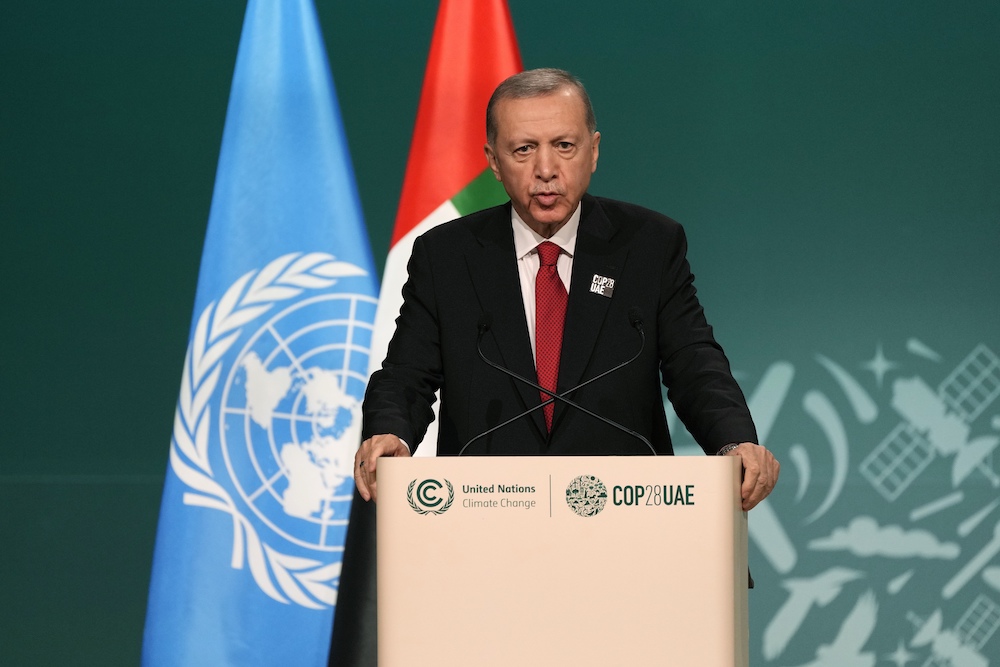
Recep Tayyip Erdogan, President of Turkiye, speaks during a plenary session at the COP28 UN Climate Summit on Dec. 1, 2023. (AP)
“When it comes to combating climate change, even though our historical responsibility of global greenhouse emissions is less than 1 percent, we’re taking significant steps with our own means,” Recep Tayyip Erdogan, President of Turkiye, said in his speech.
“We plan to reach the net zero emissions target by the year 2053, we have doubled our emission reduction target for the year 2030.”
“Within this scope, by the end of this year, we expect to have mitigated 66.6 million tons of equivalent carbon dioxide,” he added.
“The share of renewables in our installed power generation capacity has been increased up to 55 percent. With this rate, Turkiye currently ranks the fifth in Europe and the twelfth in the world in terms of installed renewable energy capacity.”
“In regard to geothermal energy capacity we are ranked the first in Europe and fourth in the world. And when it comes to hydropower, Turkiye ranks the second the Europe and ninth in the world.”
1238 GMT
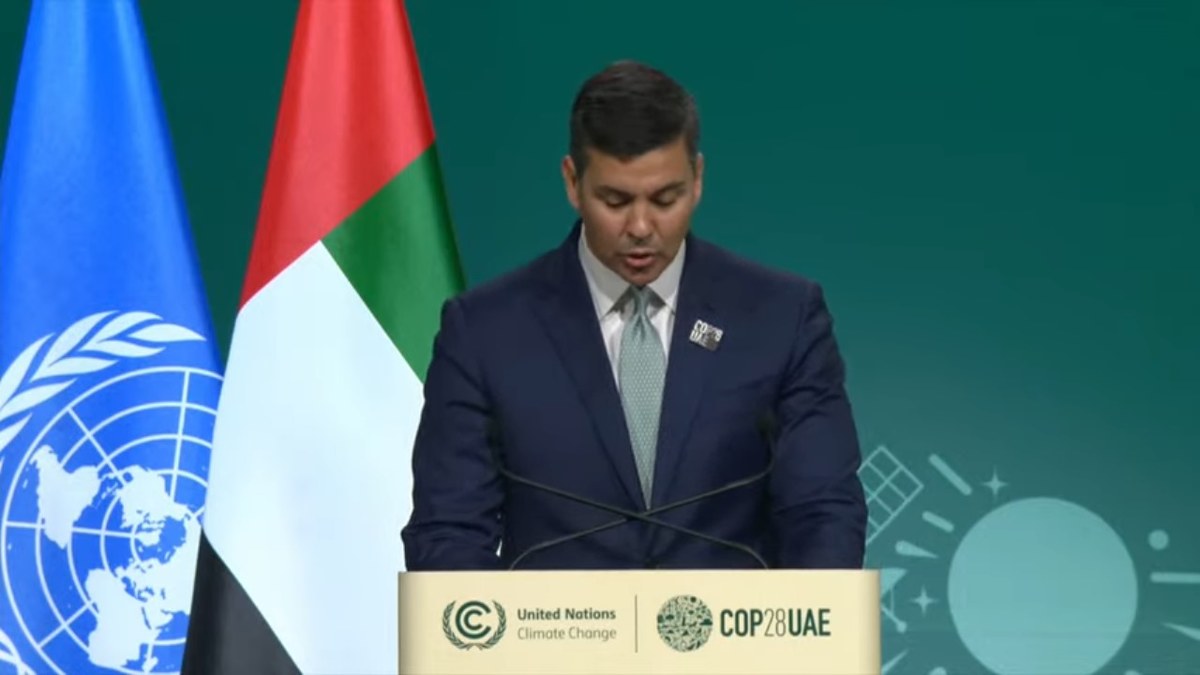
Santiago Peña Palacios, President of Paraguay.
“In my country Paraguay, all energy is clean. 100 percent is clean and renewable,” according to Santiago Peña Palacios, President of Paraguay.
1230 GMT
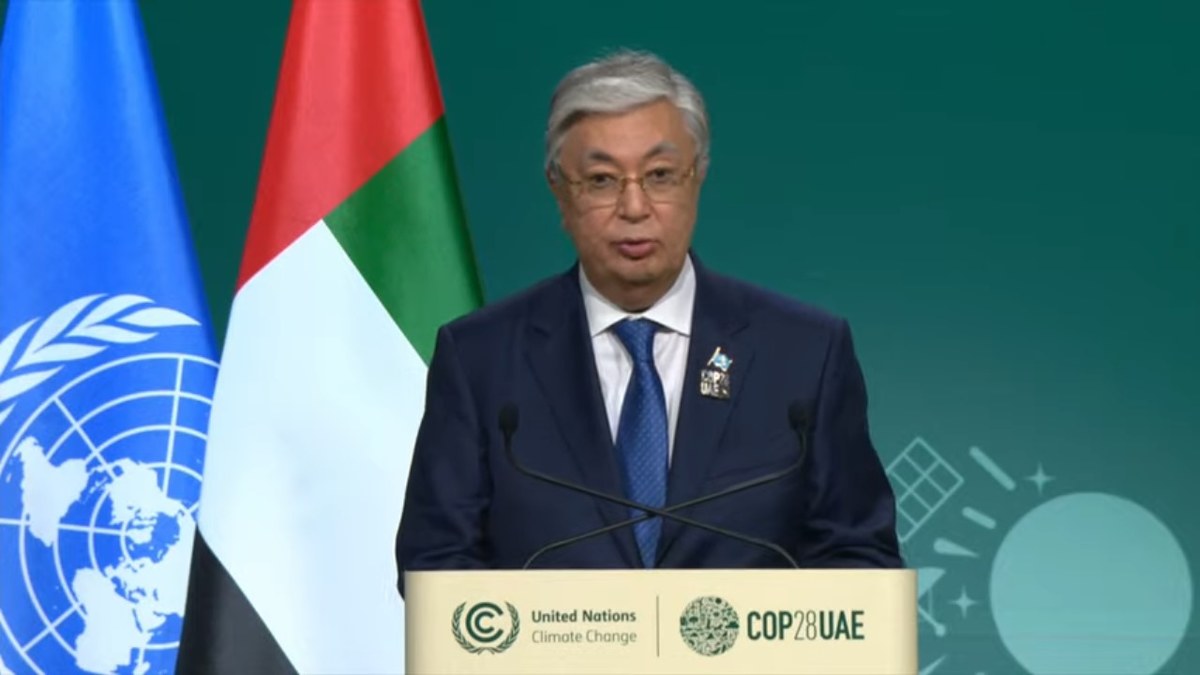
to Kassym-Jomart Tokayev, President of Kazakhstan.
“We were the first country in the region to have ratified the Paris Agreement and adopted a carbon neutrality strategy by 2060,” according to Kassym-Jomart Tokayev, President of Kazakhstan.
“The resulting new environmental code of Kazakhstan will drive comprehensive adaptation of green technology in almost every sector in our economy.”
“There is extraordinary potential for wind and solar power in my country as well as green hydrogen. We will continue to work closely with our partners to unlock it,” he said.
“As the world’s leading exporter of uranium, providing 43 percent of global supply, Kazakhstan plays a crucial role in carbon free electricity generation on a global scale. As the world decarbonizes in the coming decades, critical minerals including rare earth metals will become indispensable, Kazakhstan is poised to become a major supplier of these transition minerals.”
“To build a momentum on climate action in central Asia, we decided to convene a regional climate summit in Kazakhstan in 2026 under the United Nations’ auspices.”
1218 GMT
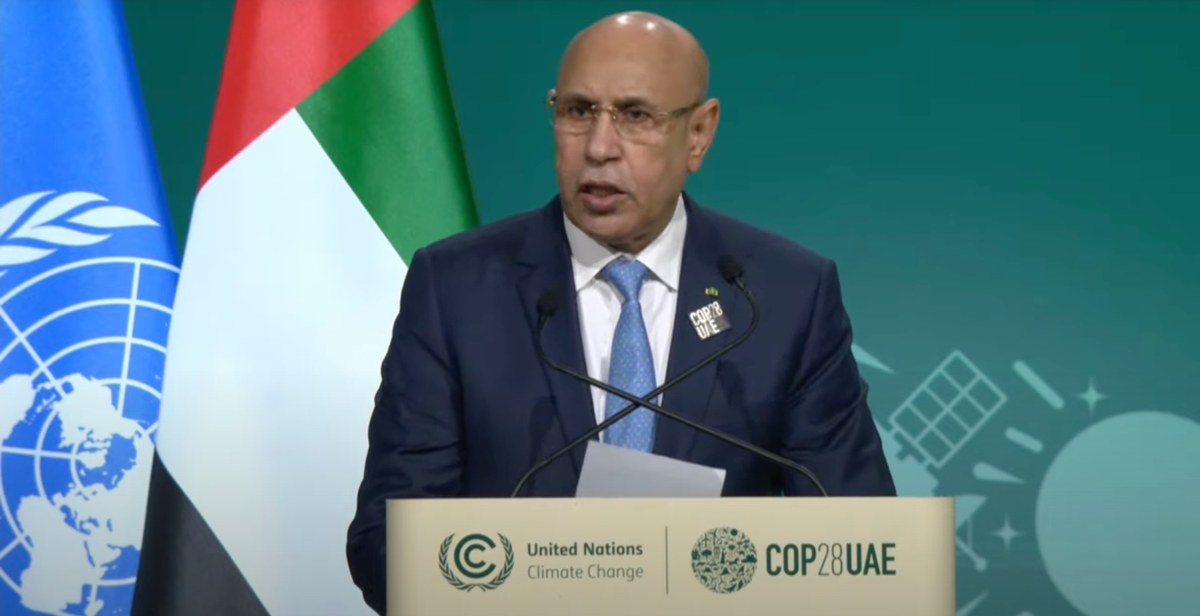
Mohamed Cheikh El-Ghazouani, President of Mauritania.
“Climate change today is a battle for all of us, we either all win or all lose,” Mohamed Cheikh El-Ghazouani, President of Mauritania, said.
“It is clear to all, that this solidarity is still not to the required level, it is therefore essential to improve finance for environmental transformation and to provide support to developing countries without adding to their debt.”
1211 GMT
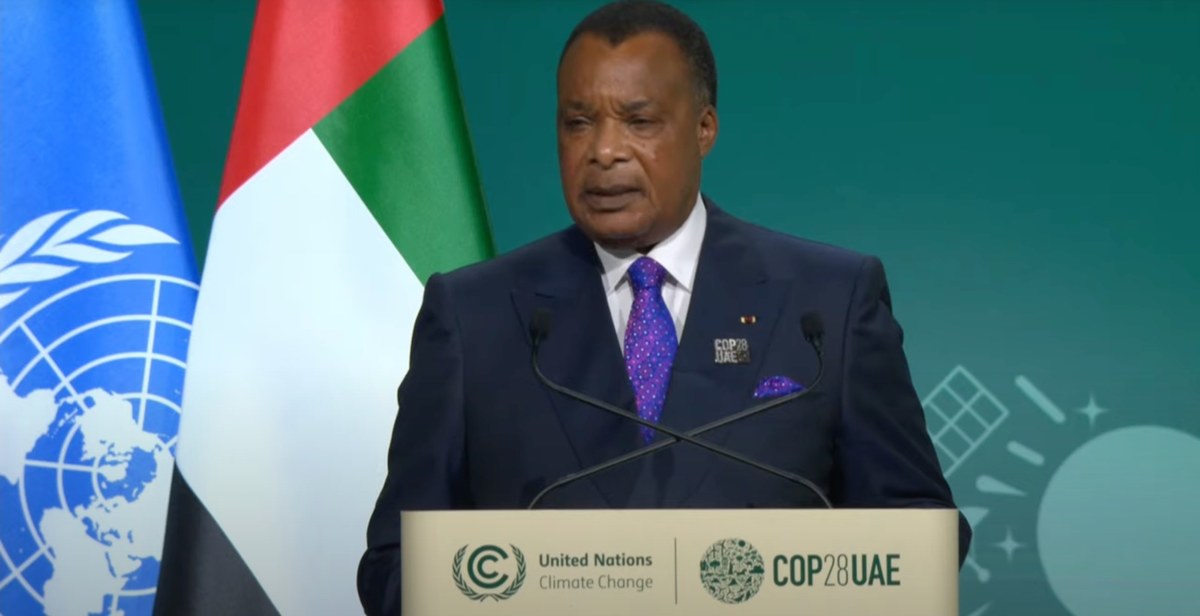
Denis Sassou Nguesso, President of Congo.
“I take this opportunity to reiterate the Republic of Congo’s steadfast commitment and determination to play an active role in the global effort to combat climate change,” Denis Sassou Nguesso, President of Congo, meanwhile said.
1205 GMT
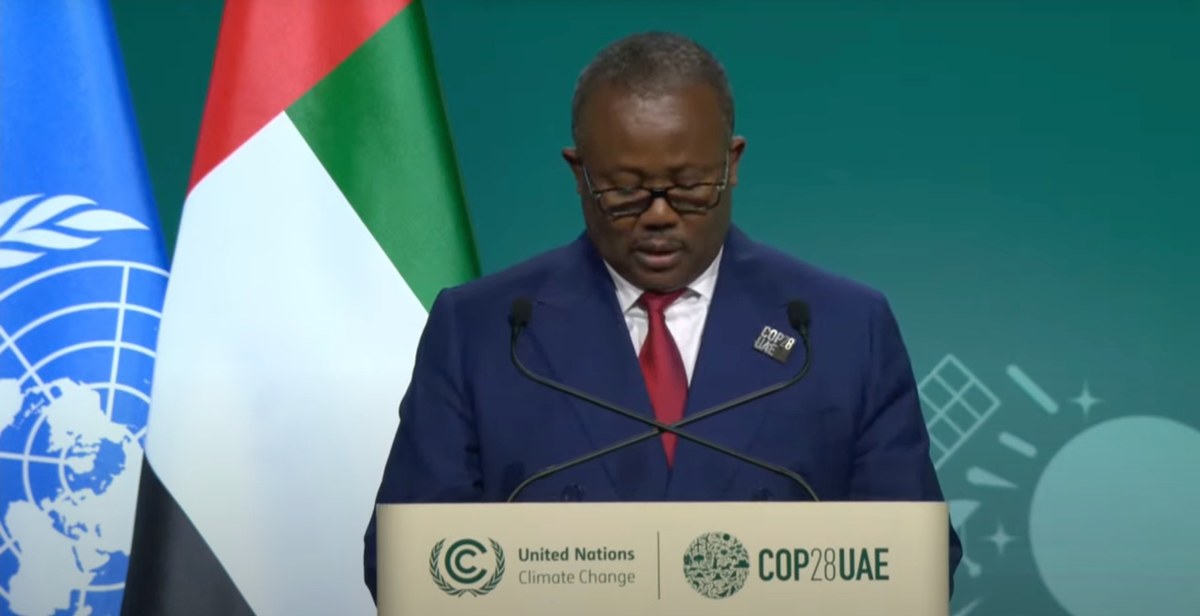
Umaro Sissoco Embalo, President of Guinea-Bissau.
“Our coastal communities face rising sea levels and their harvests are impacted by increasingly unpredictable weather patterns and we face a loss of biodiversity,” according to Umaro Sissoco Embalo, President of Guinea-Bissau.
1202 GMT
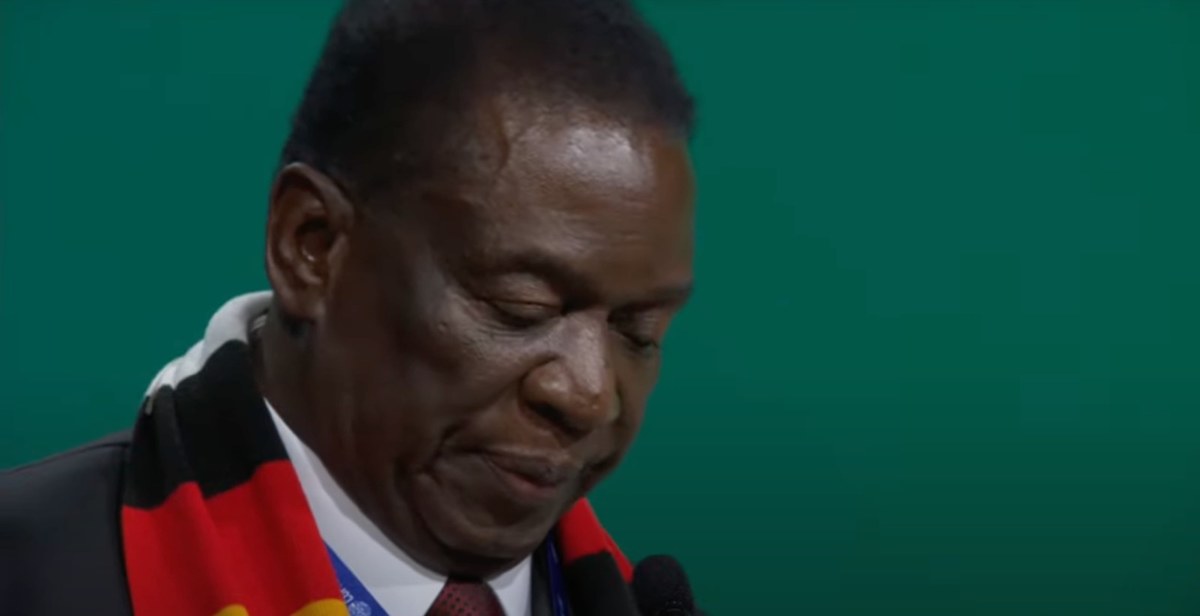
Emmerson Dambudzo Mnangagwa, President of Zimbabwe
“We are offering diverse opportunities for carbon trading in the energy sector though investment in solar, wind, and geothermal power generation,” Emmerson Dambudzo Mnangagwa, President of Zimbabwe, pitched in his speech.
1159 GMT
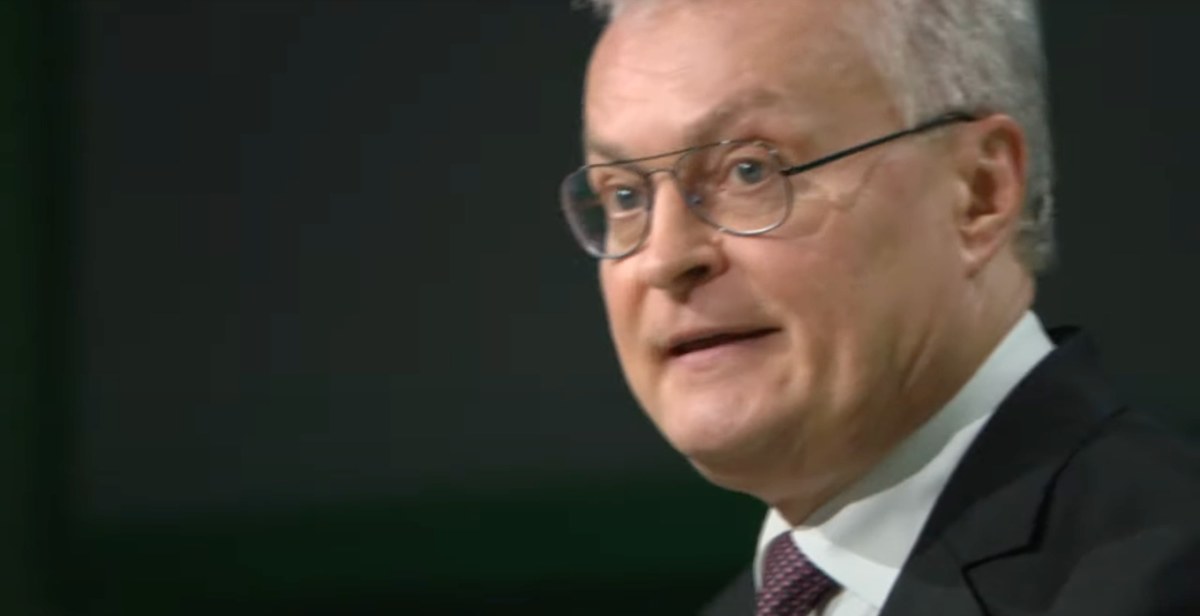
Gitanas Nausėda, President of Lithuania.
“At first, Lithuania made a strategic decision to seek energy independence. We have built our own LNG terminal which decreased prices and turned Lithuania into a regional gas hub,” Gitanas Nausėda, President of Lithuania, said in his speech.
1156 GMT
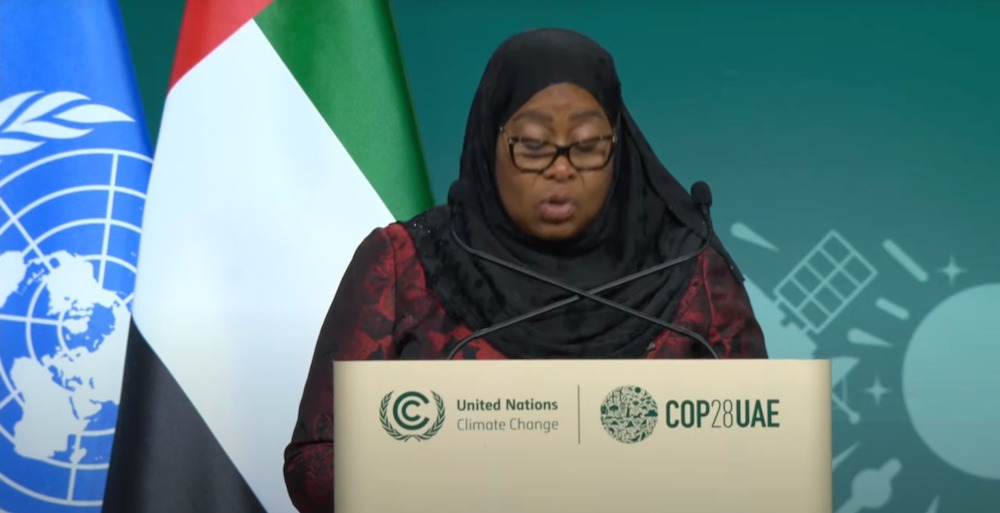
Samia Suluhu Hassan, President of Tanzania.
“At this COP28, we seek to mobilize the pot to increase the use of clean and affordable cooking fuel and technologies across Africa, especially for women,” Samia Suluhu Hassan, President of Tanzania, said at the High-Level Segment for Heads of State and Government session at the United Nations climate summit.
1150 GMT
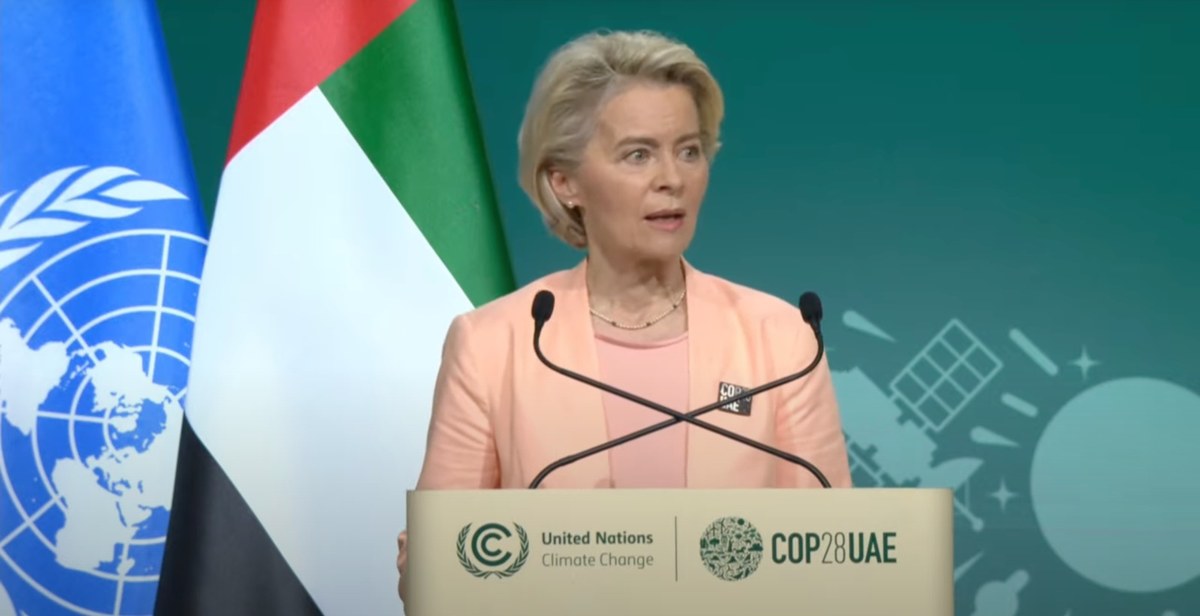
Ursula von der Leyen, President of the European Commission.
“Last September, at the climate action summit in New York, we called for concrete action. Now in Dubai we have to deliver,” Ursula von der Leyen, President of the European Commission, told the High-Level Segment for Heads of State and Government session at the United Nations climate summit.
“The European Union has peaked already, we have reduced emissions and we are on track to overshoot our target for 2030.”
1137 GMT
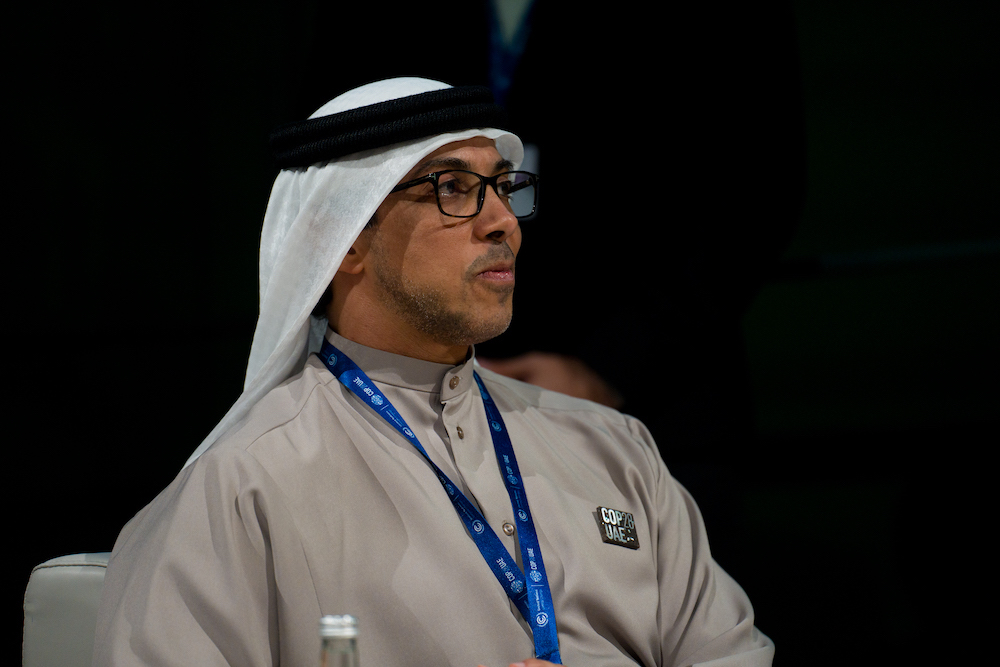
Sheikh Mansour bin Zayed Al-Nahyan, Vice President and Deputy Prime Minister of the UAE. (Abdulrahman Fahad Bin shulhub/AN)
“We work today for tomorrow, and we cooperate for the generations of the future,” Sheikh Mansour bin Zayed Al-Nahyan, Vice President and Deputy Prime Minister of the UAE, said in his speech.
“We were the first to pledge to achieve carbon neutrality by 2050. We have allocated $163 billion for expansion of renewables and to transition towards renewable energies,” he added.
1130 GMT
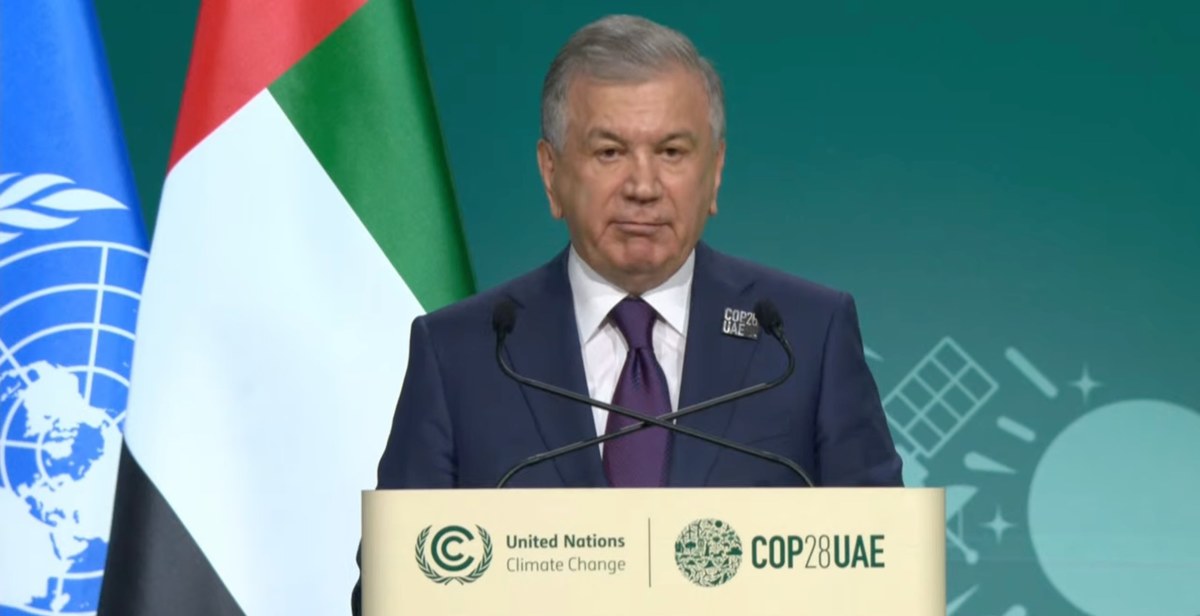
Shavkat Mirziyoyev, President of Uzbekistan, at the High-Level Segment for Heads of State and Government session at the United Nations climate summit on Dec. 1, 2023.
“We commend the global initiative of the UAE in combating climate change and its significant contribution to green development,” Shavkat Mirziyoyev, President of Uzbekistan, said in his speech.
“Transition to a green economy and achieving carbon neutrality are the key strategic objectives of new Uzbekistan… We intend to organize a conference in Uzbekistan in 2024, on the topic of climate migration” in cooperation with the United Nations.”
1116 GMT
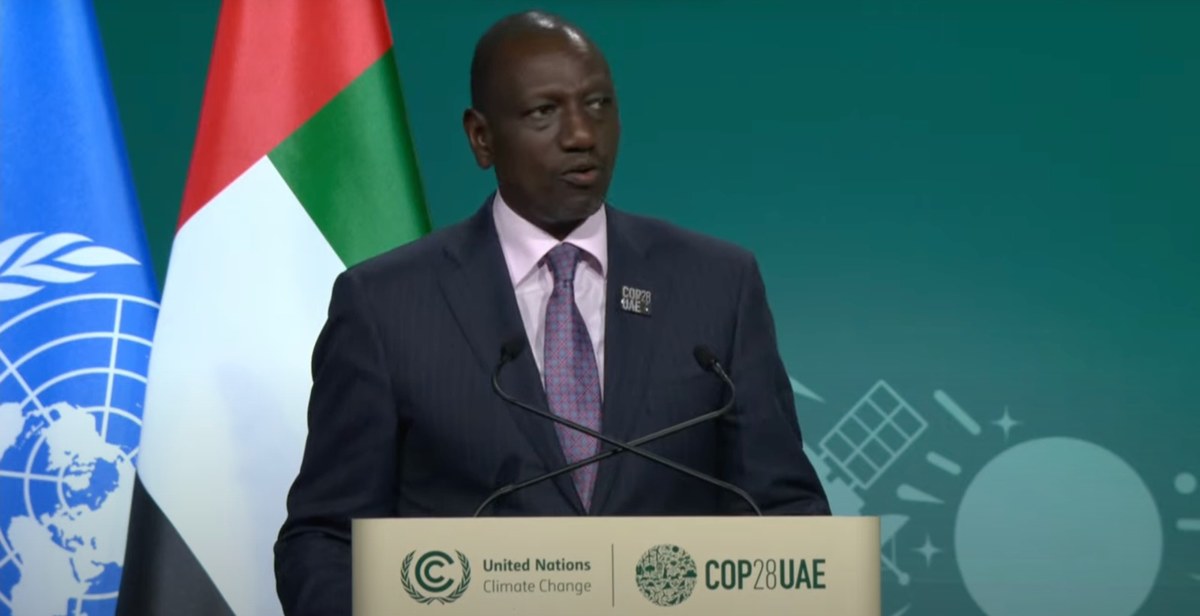
Kenyan president William K. Ruto speaks during the High-Level Segment for Heads of State and Government session at the United Nations climate summit on Dec. 1, 2023.
“As we convene here in Dubai, we must appreciate that the presence of almost 200 nations speaks volume about the magnitude of this event and what it stands for,” according to Kenyan president William K. Ruto.
“The long-standing adversarial dynamic between global north and global south proves practically counterproductive. This division has hindered our ability to unite and leverage our collective strength, and robs us of tremendous opportunities. Yet, in the face of a threat that endangers the health of our planet, and our very existence, we must find in collective action a force that neutralizes and transcends these divisions. Climate change does not respect artificial distinctions, traditional boundaries or old antagonisms. Instead, it should unite us against a shared borderless challenge,” according to Ruto.
“Turning Africa into a green powerhouse is not just essential for the continent, it is also vital for global industrialization (and) decarbonization.”
1114 GMT
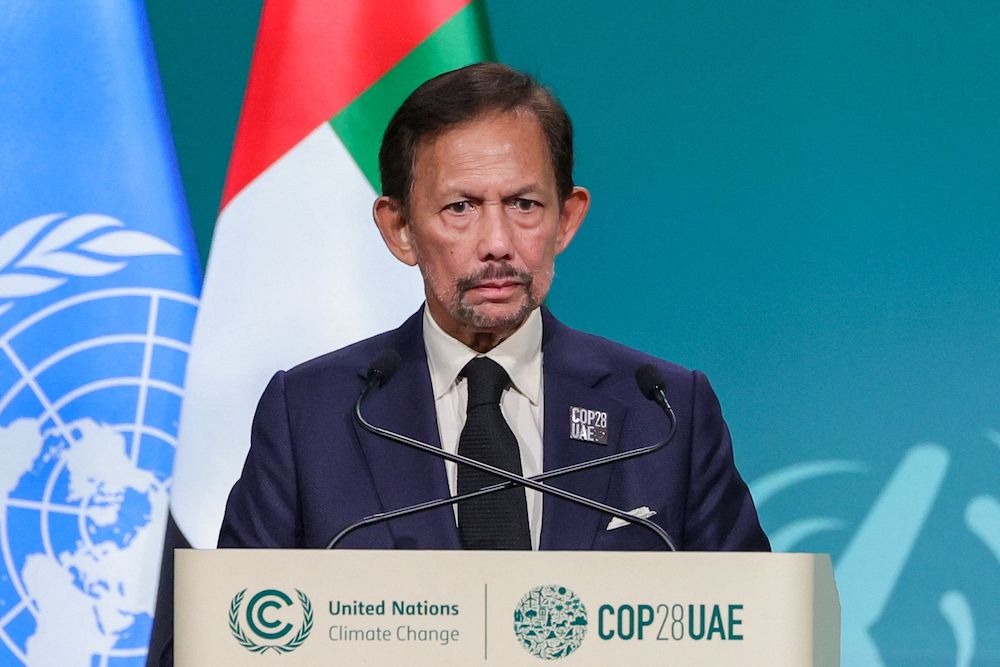
Sultan Hassanal Bolkiah of Brunei speaks during the High-Level Segment for Heads of State and Government session at the United Nations climate summit on Dec. 1, 2023. (AFP)
“Climate change has emerged as our generation’s most urgent challenge, threatening our existence,” according to Sultan Hassanal Bolkiah of Brunei.
“We aim to plant half a million trees by 2035, expanding our carbon think further,” the Brunei leader said.
1101 GMT

Jordan’s King Abdullah II speaks during a plenary session at the COP28 UN Climate Summit on Dec. 1, 2023. (Abdulrahman Fahad Bin shulhub/AN)
“This year’s conference of the parties must recognize even more than ever that we cannot talk about climate change in isolation from the humanitarian tragedies unfolding around us,” King Abdullah II of Jordan said in his speech.
“As we speak, the Palestinian people are facing an immediate threat to their lives and wellbeing. In Gaza over 1.7 million Palestinians have been displaced from their homes. Tens of thousands have been injured or killed in a region already on the front line of the climate change.”
“As we meet here today to talk about inclusivity in climate response, let’s be inclusive of the most vulnerable: Palestinian civilians impacted by the war on Gaza, populations around the world affected by conflict and poverty,” he added.
“In a region already on the front lines of climate change, the massive destruction of war makes these environmental threats of water scarcity and food insecurity even more severe,” he said, in a clear reference to fighting between Israel and Hamas militants in Gaza that resumed on Friday after a seven-day truce.
1055 GMT

Egypt’s President Abdel Fattah El-Sisi speaks during the high-level Segment session at the United Nations climate summit on Dec. 1, 2023. (Abdulrahman Fahad Bin shulhub/AN)
“COP28 is taking place amid dangerous and grave political challenges that are no less dangerous than climate change,” Egypt’s President Abdel Fattah El-Sisi said at high-level session at the United Nations climate summit.
“Egypt is well aware of the importance of reinforcing collective work to address the challenge of climate change and to guarantee eco -friendly development to preserve planet earth for coming generations.”
1041 GMT
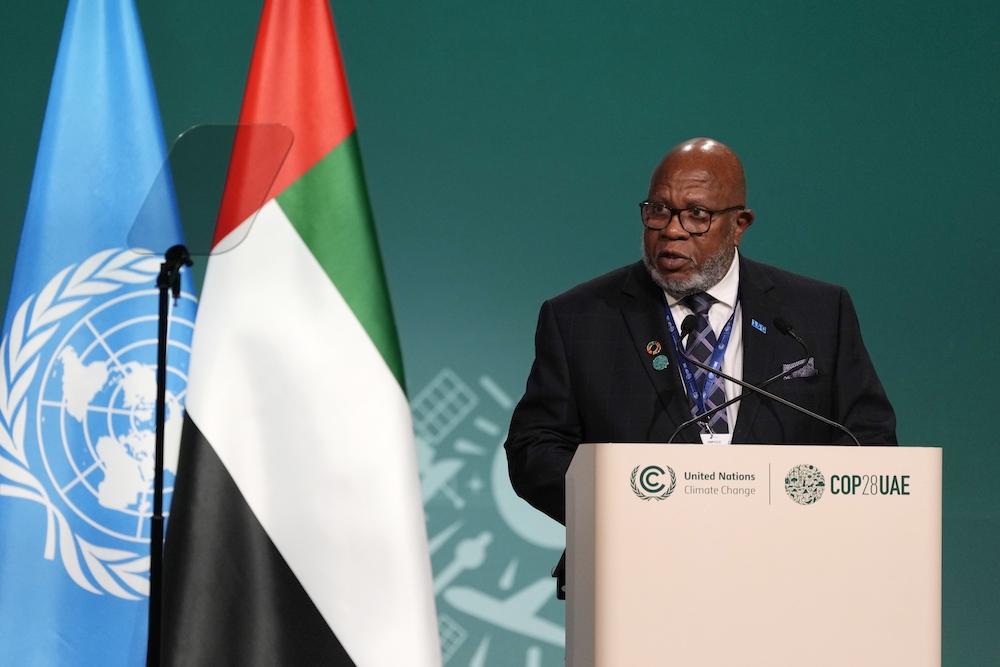
Dennis Francis, president of the UN General Assembly, speaks during a plenary session at the COP28 UN Climate Summit on Dec. 1, 2023 in Dubai. (AP)
“The Paris agreement remains the best answer to the effects of the climate crisis,” according to Dennis Francis, President of the United Nations General Assembly.
“Progressive transformative action is needed now, to stabilize the atmospheric temperature and to insure sustainability of the planet and the human civilization,” he said during a plenary session at the COP28 UN Climate Summit.
“I am pleased to announce that I will convene the first ever general assembly sustainability week at UN headquarters in New York in April 2024.”
“This week will consolidate several high level already mandated events, promoting sustainability in transport, tourism and infrastructure sectors,” Francis added.
“We need to not only be risk informed but also resilient at every level and across all stakeholders, thus leaving no one behind.”
1032 GMT
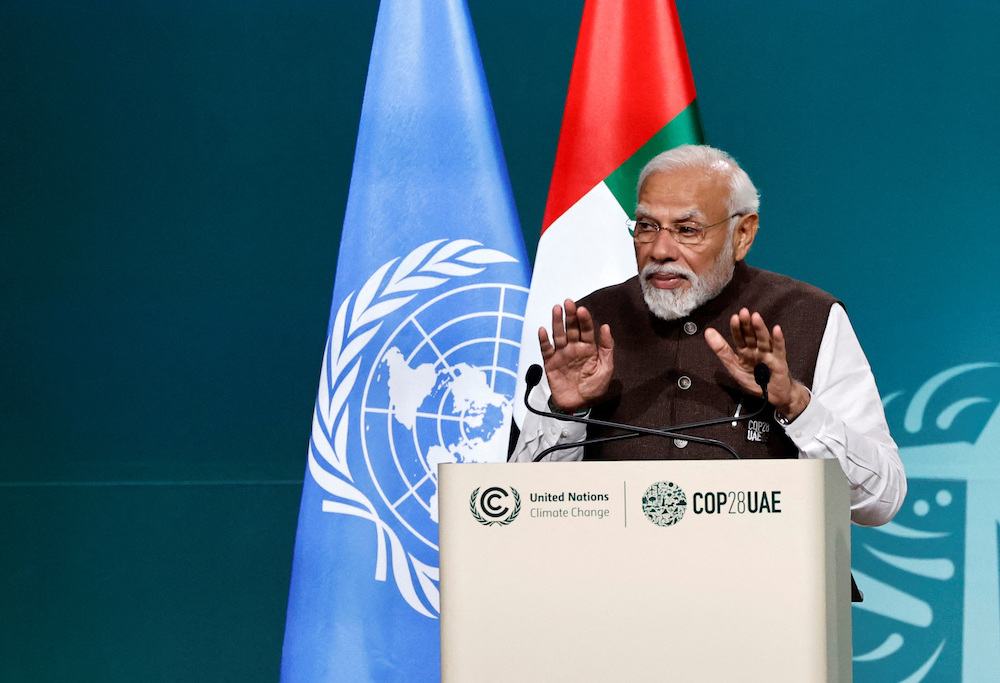
Narendra Modi, India’s Prime minister speaks at the COP28 High-Level Segment National Statements event. (Reuters)
“Thanks to our collective efforts, today the world is convinced that for the welfare of humanity, everyone’s interest must be protected and everyone’s participation is essential,” Narendra Modi, India’s Prime minister, said at the COP28 High-Level Segment National Statements event.
“We have set targets to bring our emission intensity down to 45 percent by 2030, we have decided that we will increase the share on non-fossil fuel to 50 percent and we shall continue to move ahead in achieving our goal of net zero by 2070.”
“We have together recognized that there’s a need to take climate finance commitment from billions to several trillions. We do not have much time to correct the mistakes of the last century, over the past century a small section of humanity has indiscriminately exploited nature, however entire humanity is paying the price for this,” he said.
“Friends, we do not have much time to correct the mistakes of the last century. Over the past century, a small section of humanity has indiscriminately exploited nature. However, entire humanity is paying the price for this, especially people living in the global south.”
“We must resolve that every country shall fulfil the climate targets it is setting for itself and the commitments it is making.”
Modi also offered to host the UN’s COP33 climate conference in 2028. Speaking at COP28 talks in Dubai, Modi said every country must fulfil their climate targets and “work in unity.”
“Today the entire world is watching us. Mother Earth is looking toward us to protect her future. We have to succeed,” he said.
“From this platform today, I propose that India will host COP33 in 2028.”
Modi has sought to raise India’s profile on the world stage as leader of the planet’s most populous country, which hosted a G20 summit this year.
0920 GMT
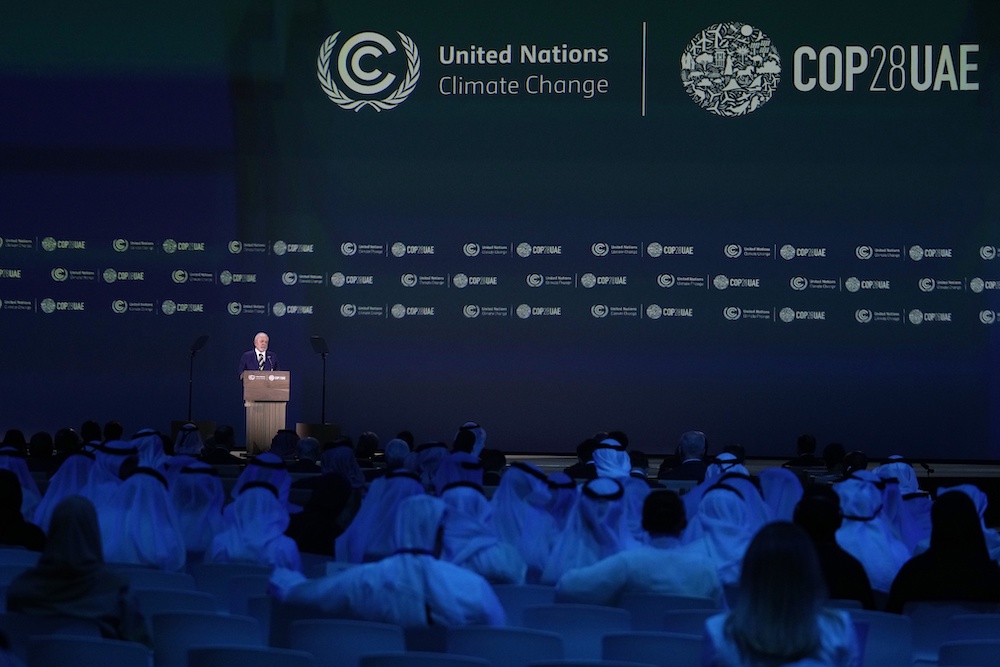
President Luiz Inacio Lula da Silva of Brazil speaks during an opening ceremony at the COP28 UN Climate Summit on Dec. 1, 2023. (AP)
Luiz Inacio Lula da Silva of Brazil, home to most of the world’s biggest natural carbon-capture zone on land, the Amazon rainforest, said “the planet is tired of climate agreements that were not fulfilled” and he said he has had enough of “eloquent and empty speeches.”
“In the north of Brazil, the Amazon region suffers one of the most tragic droughts of its history. In the South, we are facing tempests and hurricanes that lead to a lot of destruction and death,” he said.
Lula, who a year earlier was treated like a rock star after his defeat of right-wing Jair Bolsanaro, called for climate justice for poorer nations that didn’t cause the problem and railed against $2 trillion spent on weapons last year when the money should be spent on fighting hunger and climate change, not wars.
He said Brazil will stop Amazon deforestation by 2030.
“No country will solve their problems alone. We are all obliged to act together beyond our borderlines. Brazil is willing to lead as a role model,” he said. “The world is already convinced of the potential of renewable sources of energy. Now is the time to face the debate about the slow-motion pace of the decarbonization of the planet, and to work towards an economy that will be less reliant on fossil fuel. We have to do it, and in a way that is urgent and fair.”
0850 GMT
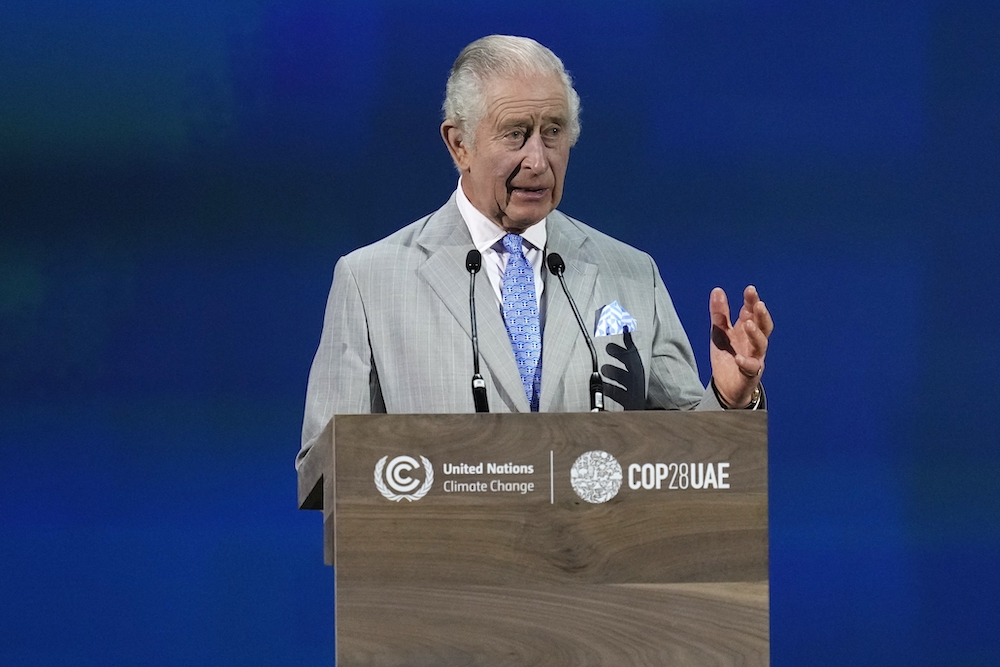
King Charles III speaks during an opening ceremony at the COP28 UN Climate Summit on Dec. 1, 2023 in Dubai. (AP)
Britain’s King Charles III is praying that the UN’s COP28 climate talks will be a “critical turning point” in the fight against global warming, he told world leaders in Dubai on Friday.
“I pray with all my heart that COP28 will be another critical turning point toward genuine transformational action,” he told the World Climate Action Summit, held in parallel with COP28.
“We are seeing alarming tipping points being reached.”
“It worries me greatly that we remain so dreadfully far off track,” the King added, after the UN’s first official progress report in September found that the world remained dangerously off course.
“In your hands is an unmissable opportunity to keep our common hope alive,” said the British monarch, wearing a light suit with pink shirt and blue tie.
The lifelong environmentalist spoke at COP26 in Scotland in 2021 but did not attend the last conference in Egypt.
The British monarch also said that “unless we rapidly repair and restore nature’s unique economy, based on harmony and balance, which is our ultimate sustainer, our own economy and survivability will be imperiled.”
“I have seen across the commonwealth and beyond, countless communities which are unable to withstand repeated shocks triggered by climate change.”
0830 GMT
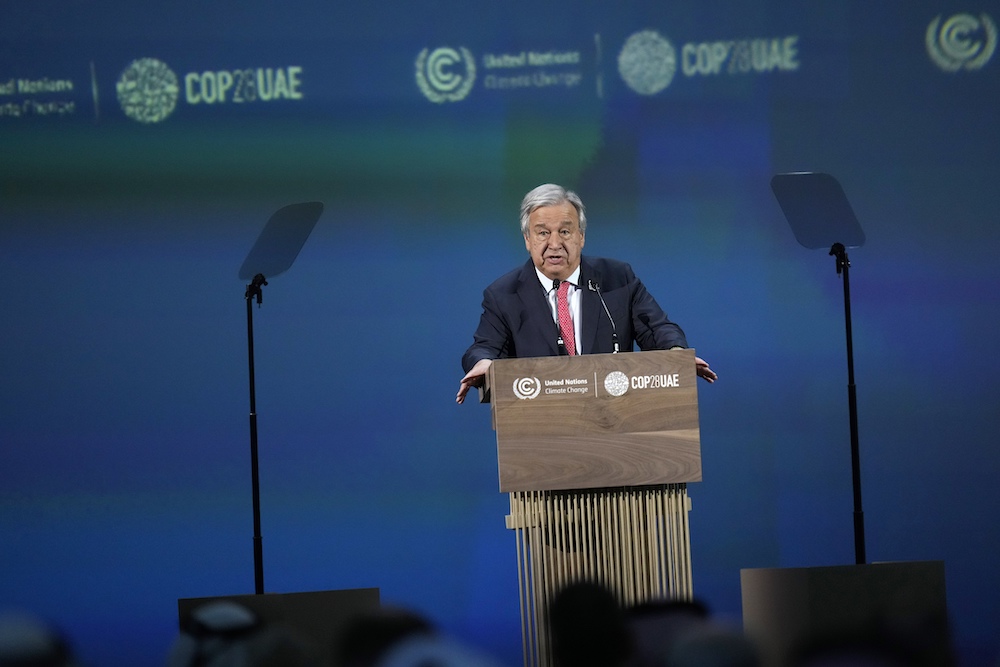
UN Secretary-General Antonio Guterres speaks at the opening ceremony of the high-level COP28 event in Dubai. (AP)
“We are miles from the goals of the Paris Agreement – and minutes to midnight for the 1.5°C limit. But it is not too late,” UN Secretary-General Antonio Guterres said in his speech.
“You can prevent planetary crash and burn. We have the technologies to avoid the worst of climate chaos, if we act now,” he said.
“The global shift to renewables is inevitable. The only question is how much heating our planet will endure before it happens,” Guterres added. “I urge countries to speed up their net zero timelines, to get there as close as possible to 2040 in developed countries and 2050 in emerging economies.”
“Climate chaos is fanning the flames of injustice,” Guterres said. “Global heating is busting budgets, ballooning food prices, upending energy markets, and feeding a cost-of-living crisis. Climate action can flip the switch.”
Guterres, a long-time critic of oil, gas and coal use that is causing climate change, fired his strongest shots yet against the industry, saying, “we cannot save a burning planet with a firehose of fossil fuels.”
In a direct contradiction to fossil fuel-aligned nations and even the presidency of the talks, he said the only way to limit warming to the goal set in 2015 requires eliminating oil, coal and gas use, saying “not reduce, not abate, phase out.”
“I urge governments to help industry make the right choice – by regulating, legislating, putting a fair price on carbon, ending fossil fuel subsidies, and adopting a windfall tax on profits.”
“Developed countries must show how they will double adaptation finance to $40 billion a year by 2025, as promised, and clarify how they deliver on the $100 billion, as promised,” Guterres said. “The climate challenge is not just another issue in your inbox. Protecting our climate is the world’s greatest test of leadership. I urge you to lead,” he added.
0815 GMT
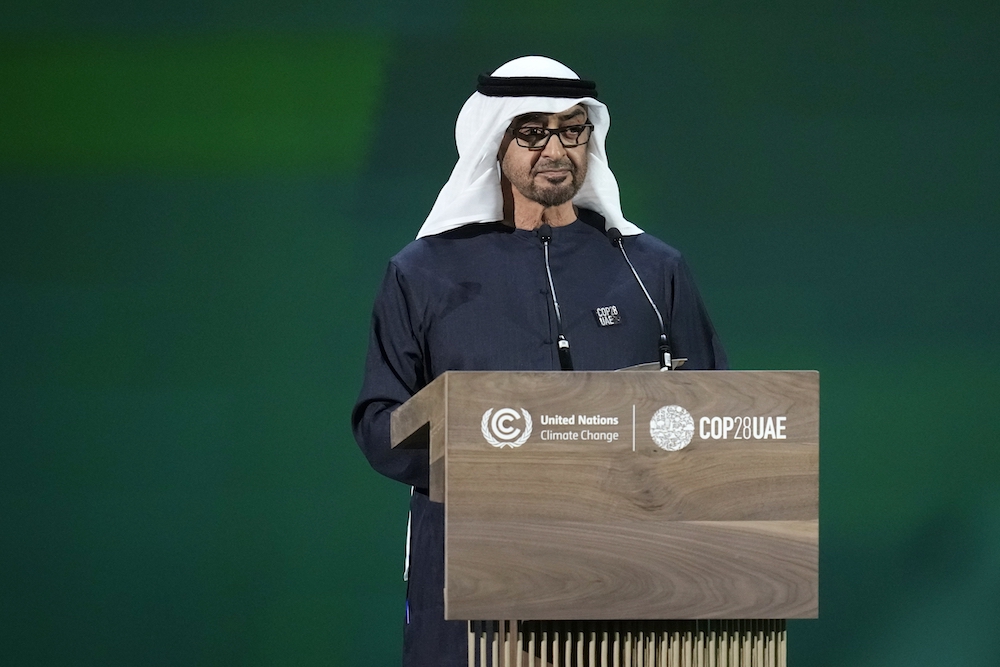
UAE President Sheikh Mohamed Bin Zayed Al-Nahyan speaks during an opening ceremony at the COP28 UN Climate Summit on Dec. 1, 2023 in Dubai. (AP)
UAE President Sheikh Mohamed Bin Zayed Al-Nahyan said that the UAE has set a national goal to achieve net-zero emissions by 2050. He highlighted the country’s strong commitment to climate action, emphasizing decades of effort in diversifying the economy and advancing capabilities in renewables.
“The UAE is committed to a 40 percent reduction in emissions by 2030. To date, we have invested $100 billion in financing climate action, focusing on renewable and clean energy. We are also committed to investing approximately US$130 billion over the next seven years,” he said in his speech
“We are finding practical ways to accelerate the world’s transition to low-emission economy,” the UAE leader said, and noted that the lack of financing has long been one of the biggest obstacles to advancing climate action globally.
Sheikh Mohamed also announced the establishment of a $30 billion climate fund for global climate solutions.
The fund is designed to bridge climate finance gap and aims to stimulate $250 billion of investment by 2030, he said.
-----
The COP28 conference notched an early victory on Thursday with the launch of a long-awaited fund to address growing loss and damage from wilder weather and rising sea in vulnerable countries.
Initial pledges have been made to the fund to officially put it into operation, with a $100-million contribution from the UAE matched with the same from Germany.
Britain gave just over $50 million, while the United States offered $17.5 million and Japan $10 million.
The European Union and its member states later confirmed a further $145 million, bringing the total to more than $420 million so far.
Delegates however face two weeks of tough negotiations on an array of issues that have long bedeviled climate talks, starting with the future of fossil fuels.
Saudi Arabia is hosting the third edition of the Saudi Green Initiative Forum on Dec. 4, alongside UN’s COP28 event, to highlight its dedication to build a greener future at a time of multibillion dollar giga-projects.
اليوم الأول من #معرض_مبادرة_السعودية_الخضراء و#حوارات_مبادرة_السعودية_الخضراء يمهّد الطريق لفعاليات ونقاشات غنية خلال الأسابيع القادمة!
منصة مهمة تجمع بين البحوث والابتكار والحوار البنّاء لتعزيز #العمل_المناخي.
شاهدوا أهم المقتطفات من فعاليات اليوم الأول وزورونا في مؤتمر… pic.twitter.com/faMNWCx22P
— Saudi Green Initiative (@Gi_Saudi) November 30, 2023
The SGI forum will gather influential figures, climate experts and thought leaders to present their insights and recommendations for tackling climate change as well as showcase the initiative’s achievements and plans.
• with agencies


